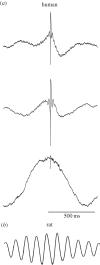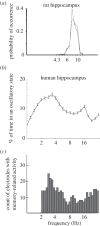Hippocampal theta oscillations are slower in humans than in rodents: implications for models of spatial navigation and memory
- PMID: 24366145
- PMCID: PMC3866455
- DOI: 10.1098/rstb.2013.0304
Hippocampal theta oscillations are slower in humans than in rodents: implications for models of spatial navigation and memory
Abstract
The theta oscillation is a neuroscience enigma. When a rat runs through an environment, large-amplitude theta oscillations (4-10 Hz) reliably appear in the hippocampus's electrical activity. The consistency of this pattern led to theta playing a central role in theories on the neural basis of mammalian spatial navigation and memory. However, in fact, hippocampal oscillations at 4-10 Hz are rare in humans and in some other species. This presents a challenge for theories proposing theta as an essential component of the mammalian brain, including models of place and grid cells. Here, I examine this issue by reviewing recent research on human hippocampal oscillations using direct brain recordings from neurosurgical patients. This work indicates that the human hippocampus does indeed exhibit rhythms that are functionally similar to theta oscillations found in rodents, but that these signals have a slower frequency of approximately 1-4 Hz. I argue that oscillatory models of navigation and memory derived from rodent data are relevant for humans, but that they should be modified to account for the slower frequency of the human theta rhythm.
Keywords: electroencephalography; hippocampus; memory; navigation; theta oscillations.
Figures



Similar articles
-
Functionally distinct high and low theta oscillations in the human hippocampus.Nat Commun. 2020 May 18;11(1):2469. doi: 10.1038/s41467-020-15670-6. Nat Commun. 2020. PMID: 32424312 Free PMC article.
-
Human hippocampal theta oscillations and the formation of episodic memories.Hippocampus. 2012 Apr;22(4):748-61. doi: 10.1002/hipo.20937. Epub 2011 Apr 27. Hippocampus. 2012. PMID: 21538660
-
Coherent Coding of Spatial Position Mediated by Theta Oscillations in the Hippocampus and Prefrontal Cortex.J Neurosci. 2019 Jun 5;39(23):4550-4565. doi: 10.1523/JNEUROSCI.0106-19.2019. Epub 2019 Apr 2. J Neurosci. 2019. PMID: 30940717 Free PMC article.
-
Memory, navigation and theta rhythm in the hippocampal-entorhinal system.Nat Neurosci. 2013 Feb;16(2):130-8. doi: 10.1038/nn.3304. Epub 2013 Jan 28. Nat Neurosci. 2013. PMID: 23354386 Free PMC article. Review.
-
Theta rhythm and the encoding and retrieval of space and time.Neuroimage. 2014 Jan 15;85 Pt 2(0 2):656-66. doi: 10.1016/j.neuroimage.2013.06.022. Epub 2013 Jun 14. Neuroimage. 2014. PMID: 23774394 Free PMC article. Review.
Cited by
-
Long-Term Dynamical Constraints on Pharmacologically Evoked Potentiation Imply Activity Conservation within In Vitro Hippocampal Networks.PLoS One. 2015 Jun 12;10(6):e0129324. doi: 10.1371/journal.pone.0129324. eCollection 2015. PLoS One. 2015. PMID: 26070215 Free PMC article.
-
Phase coding of spatial representations in the human entorhinal cortex.Sci Adv. 2022 May 6;8(18):eabm6081. doi: 10.1126/sciadv.abm6081. Epub 2022 May 4. Sci Adv. 2022. PMID: 35507662 Free PMC article.
-
Acetylcholine modulates the temporal dynamics of human theta oscillations during memory.Nat Commun. 2023 Aug 30;14(1):5283. doi: 10.1038/s41467-023-41025-y. Nat Commun. 2023. PMID: 37648692 Free PMC article.
-
Mesoscopic Neural Representations in Spatial Navigation.Trends Cogn Sci. 2019 Jul;23(7):615-630. doi: 10.1016/j.tics.2019.04.011. Epub 2019 May 23. Trends Cogn Sci. 2019. PMID: 31130396 Free PMC article. Review.
-
Primacy of vision shapes behavioral strategies and neural substrates of spatial navigation in marmoset hippocampus.Nat Commun. 2024 May 14;15(1):4053. doi: 10.1038/s41467-024-48374-2. Nat Commun. 2024. PMID: 38744848 Free PMC article.
References
-
- O'Keefe J, Nadel L. 1978. The hippocampus as a cognitive map. New York, NY: Oxford University Press.
Publication types
MeSH terms
LinkOut - more resources
Full Text Sources
Other Literature Sources
Medical
Miscellaneous

